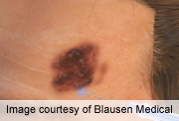
WEDNESDAY, March 28 (HealthDay News) — Growth of the deadly skin cancer melanoma may be triggered by the immune system turning on itself, according to a new study that also identified the mechanism that causes this to happen.
Melanoma accounts for only about 5 percent of skin cancers, but is the cause of most skin cancer deaths, American Cancer Society statistics indicate. The disease is often curable in its early stages but is difficult to treat once it has spread invasively, the authors of the new study noted.
The study, published in the current edition of the journal Science Translational Medicine, focused on a specific immune-inhibiting molecule called B7-H1 in melanoma tumors.
In patients with tumors that expressed B7-H1, suppression of the inflammatory immune response sped the growth and increased the aggressiveness of their tumors, the researchers from Yale School of Medicine and Johns Hopkins Medical Institutions found.
The investigators also found that tumor cells somehow use a component of the immune system itself (interferon gamma) to turn on B7-H1 and suppress the immune system.
“We were surprised to find that aggressive tumors can not only escape or hide from infiltrating immune cells, but can go on the attack — using interferon gamma as a weapon against the immune system,” lead author Dr. Lieping Chen, a professor of immunobiology at Yale School of Medicine and director of the cancer immunology program at Yale Cancer Center, said in a Yale news release.
This mechanism may be responsible for immune suppression and tumor growth in up to 40 percent of melanoma patients, Chen said. The finding may make it possible to develop therapies that block this immune-suppressing ability, he added.
More information
The American Cancer Society has more about melanoma.

